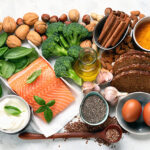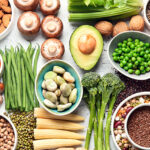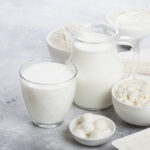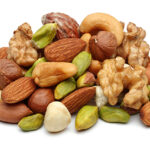WHAT’S NEW?
NUTS TO YOU
At the start of The Hitchhikers Guide to the Galaxy, the every-resourceful alien Ford Prefect buys six pints of beer, ostensibly as a relaxant, as the world is about to end … To his beers Ford Prefect also added several packets of salted peanuts from the bar. Most bars have nuts. Some are also edible. But their true purpose remains shrouded in mystery.
Eating small, protein-rich snacks (like nuts) before take-off in an aeroplane can reduce motion sickness. This may be because protein, more than any other nutrient, triggers regular, slow and smooth stomach contractions. These keep it busy and act to suppress rapid convulsive contractions associated with feeling sick, and ultimately vomiting. At the same time, when we eat, stomach emptying is slowed down due to the presence of food, meaning the rate at which alcohol levels rise is also slower. So it takes slightly longer (and more alcohol purchases) to get drunk when we are eating nuts.
Adding to the conspiracy theory, some argue that the addictively salty nuts are only there to make us thirsty, so we’ll have to buy more drinks. But this is not true. Pound for pound salty nuts don’t make us drink more than if we ate unsalted ones. Actually, the conspiracy works in reverse. It seems alcohol promotes snacking. It is no coincidence that most nuts and pretzels are displayed at just an arm’s length behind the bar. Given the plenty of calories in most beverages we shouldn’t be hungry or need to eat. But with a little disinhibiting alcohol on board, we can’t help ourselves.

This is an edited extract from Prof Merlin Thomas’s The Longevity List – Myth Busting the Top Ways to Live a Long and Healthy Life available from www.exislepublishing.com. Thomas is a physician, scientist and author who uses the cutting-edge science and research to help people live better, longer and healthier lives. He has been featured in many of the world’s leading medical journals, and is the author of Understanding Type 2 Diabetes, and Fast Living, Slow Ageing.
PEANUT ALLERGY PATCH TRIAL SHOWS PROMISE

People allergic to peanuts might soon be able to breathe easier, as peanut patches designed to help those with allergies to become less sensitive have shown promise in a recent US clinical trial. The patch provides continual exposure to controlled amounts of peanut proteins and doesn’t pose the risk of triggering the allergy that actually eating peanuts would. The trial used patches with low, intermediate and high doses of peanut protein; compared to the placebo, those given the high dose patch reacted less when given real peanuts to eat.
Study
NEW HIGH PROTEIN, LOW FAT, LOW GI ICE-CREAM

Ice-cream is usually considered a treat. But it’s worth remembering it’s a useful source of bone-building calcium plus the protein and vital vitamins found in milk. The GI of regular ice cream (37–49) is generally a little higher than milk or yoghurt because of the added sugar.
ProYo have recently launched a better-for-you, low-fat ice-cream that’s higher in protein than regular ice-cream and has a lower GI (25–39, depending on the flavour). What’s in it? According to the ingredient list for vanilla: “Skim Milk, Whole Milk, Whey Protein Concentrate, Xylitol (Natural Sweetener), Cane Sugar, Inulin, Natural Flavors, Ground Vanilla Beans”. Before you ask … inulin is a fructan, a type of soluble dietary fiber found in agave, artichokes, asparagus, bananas, carrots, chicory root, garlic, Jerusalem artichokes, jicama, leeks, onions, wheat, and yacon. The food industry’s main sources are chicory root and Jerusalem artichoke. Xylitol is a polyol (sugar alcohol) that may be good for your teeth.

We asked two dietitians to comment. “What a great product this is for nursing homes where the frail elderly need palatable foods they enjoy eating that will give them the calories, protein and calcium they need and that are easy to swallow,” says dietitian Nicole Senior.
“ProYo delivers balanced nutrition and real ice cream flavor and texture,” says registered dietitian Carrie Gabriel who makes the point it’s also versatile. “You can put a 4oz (115g) scoop in your morning smoothie to get 10g of protein; use it instead of milk to make baked goods; or enjoy a scoop as a delectable dessert,” she says.







